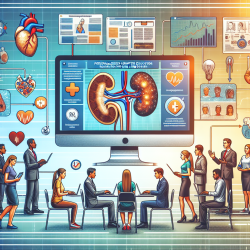Introduction
Adverse childhood experiences (ACEs) have long been associated with negative health outcomes in adulthood, particularly chronic conditions such as cardiovascular disease (CVD). However, recent research highlights that the effects of ACEs can manifest much earlier, during childhood, impacting cardiovascular health. Understanding these early impacts is crucial for practitioners working with children, especially those providing online therapy services, such as those offered by TinyEYE.
Research Findings
The study titled "Adverse childhood experiences and the cardiovascular health of children: a cross-sectional study" explores the relationship between ACEs and early childhood risk factors for adult CVD. The research involved 1,234 grade six to eight students, examining variables such as blood pressure (BP), heart rate (HR), body mass index (BMI), and waist circumference (WC). The study found that children who experienced four or more ACEs showed significant increases in HR, BMI, and WC, indicating early markers of cardiovascular risk.
Implications for Practitioners
For practitioners, these findings underscore the importance of early intervention. Here are some actionable steps to consider:
- Screen for ACEs: Implement routine screening for ACEs in children to identify those at risk early. This can help tailor interventions to address specific needs.
- Promote Healthy Lifestyles: Encourage physical activity and healthy eating habits to mitigate the impact of ACEs on BMI and WC.
- Provide Emotional Support: Offer counseling and emotional support to help children cope with the stress associated with ACEs, potentially reducing their physiological impact.
- Collaborate with Schools: Work closely with schools to create supportive environments that can buffer the effects of ACEs.
Encouraging Further Research
While this study provides valuable insights, it also highlights the need for further research. Practitioners are encouraged to explore the following areas:
- Longitudinal Studies: Conduct studies that track children over time to better understand the long-term impacts of ACEs on cardiovascular health.
- Intervention Efficacy: Evaluate the effectiveness of various interventions in reducing the cardiovascular risks associated with ACEs.
- Broader ACEs Spectrum: Investigate the impact of a wider range of ACEs, including those not covered in the current study, such as physical and sexual abuse.
Conclusion
The evidence is clear: ACEs can have profound effects on children's cardiovascular health, which can manifest much earlier than previously thought. By integrating these findings into practice, speech-language pathologists and other practitioners can play a crucial role in mitigating these risks and improving outcomes for children. For those interested in a deeper dive into the research, please refer to the original paper: "Adverse childhood experiences and the cardiovascular health of children: a cross-sectional study".










